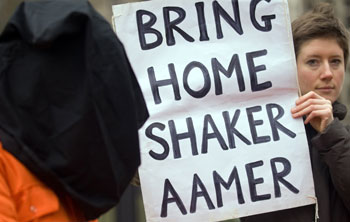Ex-detainees to ‘give money to last Briton in Guantanamo’
The ex-Guantanamo Bay detainees who will receive millions of pounds in a settlement with the Government will set aside a portion for the last Briton still in the US prison, Channel 4 News understands.

A source close to the agreement told Channel 4 News that the men (thought to be between 15 or 16 in number) will give Shaker Aamer – who has been in Camp Delta for more than eight years – part of their settlement money, which will “most probably go towards his legal fees.”
According to reports, one former detainee will receive around £1 million.
Among those said to be receiving settlement payments are Aamer’s best friend, Moazzam Begg, Binyam Mohamed, Bishar Al Rawi, Jamil El Banna, Richard Belmar, Omar Deghayes, and Martin Mubanga.
The men had claimed that the Government knew they were being illegally transferred to Guantanamo Bay but failed to prevent it.
“It’s not compensation, it’s a settlement.” Prime Minister David Cameron
Some also alleged that British security and intelligence officials colluded in their torture and abuse in various countries.
The settlement was announced to MPs in a written statement by the Justice Secretary, Kenneth Clarke, who said the details would remain confidential.
“No admissions of culpability have been made in settling these cases,” he told MPs.
The settlement will enable an independent inquiry to be launched into the torture allegations, probably under the former Appeal Court judge Sir Peter Gibson.
Mr Clarke said that the alternative to accepting a mediated settlement was “protracted and extremely expensive litigation” – possibly running at £30-50m – “with the Government unable to be sure it could defend the security and intelligence agencies without compromising national security”.
“And in our view there could have been no inquiry until that litigation had been resolved,”he added.
With an estimated 500,000 documents said to be involved, Ministers also feared that vetting the material would absorb huge amounts of time for MI5 and MI6.
Despite earlier reports that the agreement was a compensation package, Prime Minister David Cameron said: “It’s not compensation, it’s a settlement.”
Legal battle
The previous government lost a legal battle earlier this year to prevent the disclosure of US intelligence material relating to allegations of abuse by CIA agents.
The Prime Minister authorised the negotiations in July after a court ruling ordering the disclosure of confidential documents.
Amnesty International’s Director of Europe and Central Asia Programme Nicola Duckworth said: “Financial compensation can be an important part of the right to remedy and reparation for victims of grave human rights violations. However, it remains only one part.
“The need for full and public disclosure of the truth about serious human rights violations and the duty of states to hold those responsible to account remain essential and must not be swept aside.
“To date these rights have been obstructed by persistent efforts on the part of the UK government to prevent disclosure of evidence relevant to these allegations, during court proceedings and elsewhere.
“Amnesty International takes no position on the appropriateness of the particular payments announced in these cases. However, in any event, we continue to believe that a human rights compliant commission of inquiry is needed to establish the truth about what happened.”